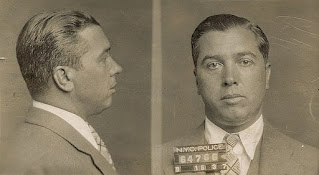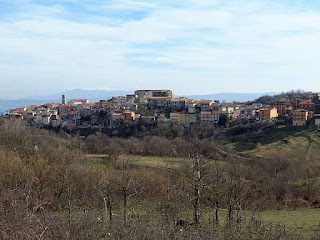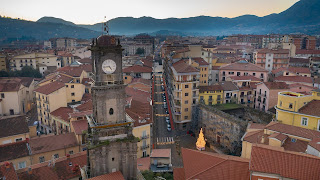Boy from mountainous Campania who became powerful New York mobster
 |
| The mug shots of Joe Adonis held in the files of the New York police department in the 1930s |
Doto became a friend and associate of the powerful Charles ‘Lucky’ Luciano, who would head one of the New York Mafia’s powerful Five Families. As Adonis, Doto would emerge as a powerful figure in his own right in Brooklyn and Manhattan and later New Jersey.
Accounts of his arrival in the United States as a child vary. Many suppose that he travelled with his family among thousands of migrants from Italy who left for a new life in America in the 1900s, their names recorded at the immigrant inspection station on Ellis Island in 1909.
Others suggest that he arrived in 1915, having travelled as a stowaway on a liner from Naples. Either way, he appears to have settled in Brooklyn, where he quickly turned to crime, making money through stealing and picking pockets.
It was in partnership with Luciano and two up-and-coming figures in the Jewish-American underworld, Meyer Lansky and Bugsy Siegel, that he became involved in bootlegging soon after the National Prohibition Act made the sale of alcohol illegal. Doto, who had a natural charm, found numerous clients among the actors, writers and producers that frequented the Broadway theatre scene.
 |
| Charles 'Lucky' Luciano, pictured in Rome in the 1940s, was a close friend of Adonis during his heyday |
Seeking to advance their careers as the Italian and Jewish gangs expanded their reach in the New York crime scene, Adonis became an enforcer for Frankie Yale, a Brooklyn racketeer, while Luciano took on a similar role working for Giuseppe Masseria.
Masseria became embroiled in a bloody battle for power with Salvatore Maranzano known as the Castellammarese War. By this time Adonis was working for Masseria. When ultimately, it became clear that Maranzano would prevail, Luciano secretly offered his services to Maranzano.
Word of this betrayal reached Masseria, whose immediate reaction was to want Luciano dead. He made the mistake, however, of asking Adonis to arrange the killing. Loyal to Luciano, Adonis warned his friend, who came up with a counter plot to eliminate Masseria.
This involved arranging a meeting with Masseria at a restaurant on Coney Island on 15 April, 1931, at one point in which Luciano excused himself to go to the bathroom. In his absence, Adonis, Siegel and two others - Vito Genovese and Alberto Anastasia - entered the restaurant and simultaneously opened fire on Masseria.
 |
| Salvatore Maranzano was ultimately killed by the ruthless Luciano |
Now Maranzano wanted Luciano out of the way but again Luciano was tipped off and instead, on 10 September, 1931, it was Maranzano who was killed, gunned down in his office in Manhattan by Luciano loyalists.
Adonis and Luciano presided over a lucrative bootlegging operation in Brooklyn and Midtown Manhattan, Adonis also moving into car sales and buying vending machines which he filled with stolen cigarettes. Luciano built on Masseria’s ideas for organising the New York crime scene by setting up a national committee, known as the 'Commission' or the 'Syndicate', as an umbrella organisation for gang activity across the whole of North America.
Meanwhile, Adonis helped protect himself and Luciano from attention by bribing politicians and high-ranking police officers.
Not everyone could be bought, however, and their luck ran out in 1936 when Thomas E Dewey, a state prosecutor, secured a conviction against Luciano on charges relating to his prostitution rackets that put him in jail for 30 years.
Genovese briefly took control of the Luciano family but fled to Italy to avoid prosecution in 1937, leaving Frank Costello as the new Luciano family capo, with Adonis at the head of the 'Syndicate'.
Luciano was released from prison in 1946 after helping the United States military plan their invasion of Sicily in 1943, but only on condition he was deported to Italy. Nonetheless, Luciano tried to hang on to his operations in New York and met with Adonis and other crime bosses in Havana, Cuba in 1946, with the intention of using the island as his base. Within less than a year, however, he was sent back to Italy after US authorities put pressure on the Cuban government to expel him.
 |
| Adonis pictured around the time he was deported to Italy |
Convicted in 1951 on charges of operating three illegal gambling rooms in New Jersey, he was handed a two-to-three year jail sentence, during which it was established that he had never obtained American citizenship and was deported as an illegal alien, eventually leaving after his last appeal against the deportation order was thrown out in 1956.
He managed to move enough money to bank accounts in Italy to live out the next decade or so in comfort, with an apartment in Milan and a villa outside Naples. Although Luciano also lived in the Naples area, they never met. Adonis did attend his former associate’s funeral in 1962, however.
Adonis himself died in 1971. Arrested by Italian police as part of a general round-up of Mafia suspects, he was moved to Serra de' Conti, a small town near the Adriatic, along with more than 100 other mobsters for questioning over the murder of Pietro Scaglione, the public prosecutor in Palermo, Sicily. Under interrogation, Adonis suffered a heart attack and died in hospital in nearby Ancona.
Despite having declared him an alien, the US government acceded to requests from Adonis’s family, who had remained in New Jersey, to have his body flown back to America and, after a small funeral attended only by immediate family, he was buried at Madonna Cemetery in Fort Lee, New Jersey, under the name of Joseph Anthony Doto.
Travel tip:A view of the town of Montemarano, situated in
the hills of inland Campania, near Avellino
Giuseppe Antonio Doto’s home town of Montemarano, situated about 30km (19 miles) east of the city of Avellino by road, is a good example of a typical town in Irpinia, the inland area of Campania that clings to ancient traditions. The area produces famous Campania wines such as Fiano di Avellino, Greco di Tufo, and Taurasi and among several festivals taking place annually in Montemarano is the Festa del Vino. Another is the Festa del Bosco, dedicated to woodlands produce such as chestnuts, mushrooms, and truffles. The annual Carnevale di Montemarano features the tarantella montemaranese, the town’s own version of the traditional southern Italian folk dance.
Travel tip:A view over the largely rebuilt city of Avellino,
which suffered war and earthquake damage
The city of Avellino has its origins in the ancient Roman settlement, Abellinum, although the present city was founded by the Lombards and ruled at different times by the Byzantines, Normans, Swabians, Angevin, Aragonese, the Viceroy of Spain, the Austrians and the Bourbons. Heavily bombed during World War Two by Allied planes attempting to cut off the retreat of German panzer units, it suffered further massive damage in the huge earthquake that affected the area in 1980. Nonetheless, it has a cathedral, dedicated to the Madonna dell 'Assunta, that was built in the 12th century and has a neoclassical facade redone in 1891.
Also on this day:
1533: The birth of Alfonso II d’Este, the last Duke of Ferrara
1710: The death of Baroque composer Bernardo Pasquini
1947: The birth of football coach Nevio Scala
1949: The birth of businessman Rocco Commisso
1954: The birth of former prime minister Paolo Gentiloni

